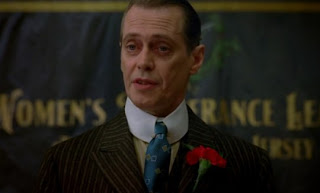Socialism, Britpop, literature and the representation of the proletariat in the media.
Saturday, 30 April 2011
Tuesday, 12 April 2011
Under the Boardwalk.

The first season of Boardwalk Empire just finished airing and it's a strange beast to dissect. There doesn't seem to be anything straightforward about anything in the show, least of all the characters.
First of all, Steve Buscemi's character Enoch Thompson. He is definitely the most well-rounded character in the whole series. Buscemi does carry off some pathos throughout the series as the death of his wife and child plays on him. However, as he is essentially the lynchpin of the show, I would argue his character symbolises the show in microcosm; Enoch can often be seen to be plagued by guilt, and Ithink that this is one of the recurring themes of the series. Guilt and redemption (or lack of).
Let's just look closer at this. The Atlantic City of 1920 portayed here has a number Irish or Irish-descended characters, as well as Italians. And all these ethnicities, in keeping with the heavy sense of Catholicism, tend to mention heaven, hell, sin and forgiveness. 'Nocky' Thompson himself, we are told, will often be overcome with guilt because of his criminal transgressions, but then always overcomes this.
And this does not only effect the principal gangsters. Enoch's live-in lover. Margaret (Kelly Mcdonald) does feel guilt for so readily accepting her new lavish lifestyle. However, again poblems present themself in the execution of themes I feel, as this devout and temperate woman is more hurt by the perception of her made by others, which seems a strange trait to so quickly develop.
This brings me on to the next section, the depiction of women. Now first and foremost this is the 1920s, and as such critics can say "in those days women were inferior" should any sexist or misogynistic behaviour occur. However, it occurs to me that misogyny does rear it's ugly head, bit from a modern perspective, not its early twentieth-century setting. It has been argued before that Scorsese, (here the executive producer) perhaps due to his heritage and upbringing, depicts women as one of only two archetypes; the madonna or the whore. This seems to be the case here. Granted, the character of Margaret (Kelly Mcdonald) appears to be a strong-willed, independent woman who alligns herself with the suffragette movement, but as already mentioned, her apparent ease of which she accepts the lifestyle of a politician's girlfriend can be read as a sign of modern womanhood or the 'whoring' of her scruples. As for the other female characters, we can say that the ignorance and simplicity of certain characters is certainly in keeping with the atmosphere of the 1920's, but there is definitely a modern, masculine perspective in some portrayals that Laura Mulvey would simply salivate over. Lesbian affair? Check. Naked opium-addicted call girls with a penchant for abusive men? Check. One can almost imagine Scorses (and indeed exec-producer Mark Whalberg) standing just off-camera dictating the action like it's 'Nocky and Margaret make A Porno'.
However, in the defence of misogynists everywhere, the men are not so easily defined archetypes themselves. Prohibition agent Van Alden, despite perfectly appearing as the epitomy of chisel-jawed machismo with an unbendable will, is not as clean-cut or simplistic a character as first suggested. And Buscemi is perfect as Enoch, as his pasty white frame here is 20's America in microcosm; his wiry frame and sallow face, like his soul, is wasting away as he chases the acquisition of power. This leaves him more and more hollow.
So, a strange breed filled with enigmas and unclear character traits. Lazy writing or inspired protagonist creation? Either way I would argue it's still a good show and I shall continue to watch, even if, like one of the themes, with a degree of guilt.
Labels:
boardwalk empire,
buscemi,
guilt,
machismo,
scorcese.
Subscribe to:
Comments (Atom)